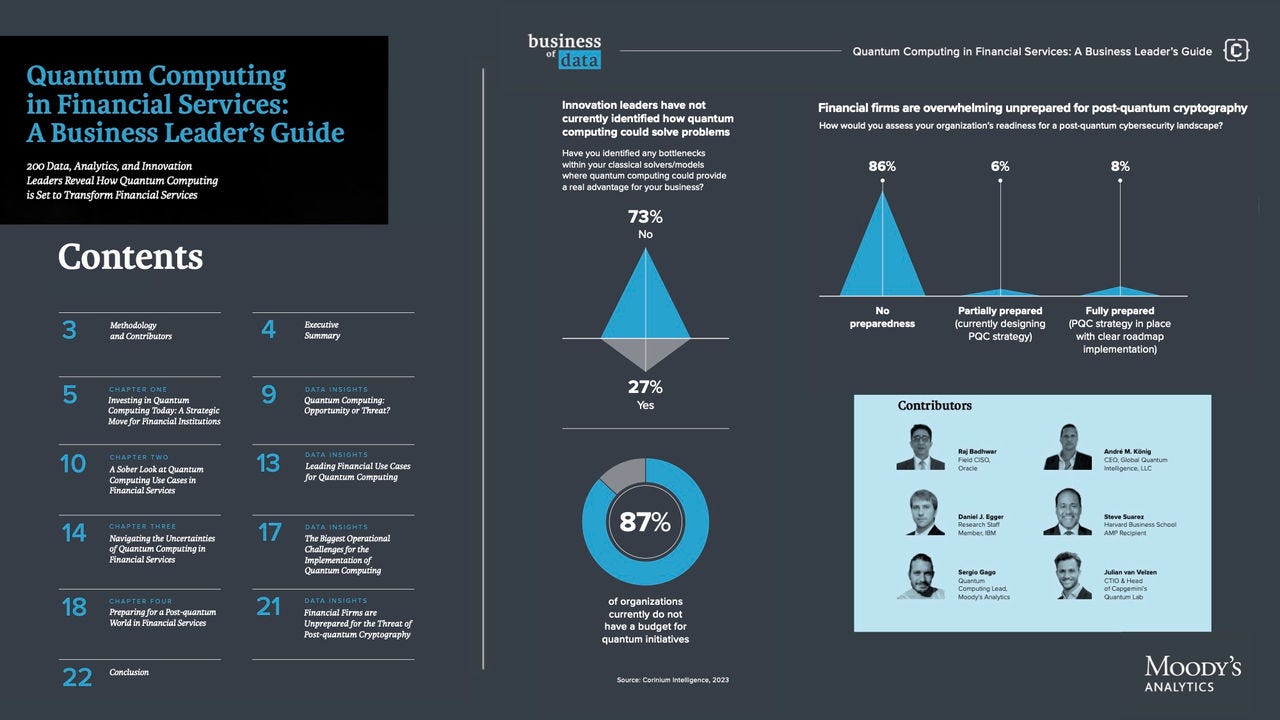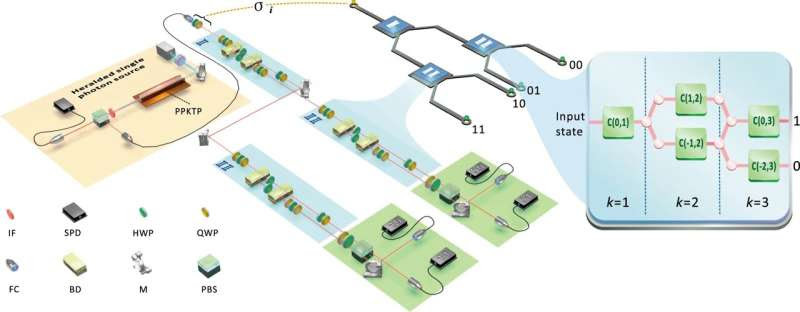The Week in Quantum Computing - May 29th
Issue #139
The Week in Quantum Computing. Brought to you by Sergio Gago (@piratecto).
200 Data, Analytics, and Innovation Leaders Reveal How Quantum Computing is Set to Transform Financial Services
Are companies really investing in Quantum? Well, 73% of financial leaders have not identified bottlenecks or problems to use with QCs and as such, 87% of companies are not budgetting for is. Why? Read it in the Moody’s Analytics report :
» Download the Free Report
Quick Recap
We got the promise of 100.000 qubits by IBM. I hope they are better than the current 433, but still, a great promise that keeps pushing the field. A BCG report suggests quantum computing is inching closer to business-readiness, despite the undefined standards of quantum advantage (although in Moody’s we have a different opinion). Classiq, along with NVIDIA (watch out for their share price!) and Rolls-Royce, reported a breakthrough in computational fluid dynamics with a quantum computing circuit 10 million layers deep with 39 qubits.
Meanwhile, Quantum Computing Inc. ("QCI") has announced its intent to acquire the AI firm, Millionways, signalling the growing intersection of quantum computing and AI, and how a company with almost no revenue has also the right to do M&A. UK-based Quantum Motion has raised over £62 million, with Sony Innovation Fund joining its recent investment round. Quantum technologies also show promise in complex systems modelling. The University of Pittsburgh has announced an $11.6 million allocation to establish a quantum computing innovation hub, demonstrating the growing interest in this field in academia. The famous Qiskit Summer School is out, so hurry up if you want to signup! Fraunhofer releases Qrisp, a new programming language (as if the language was the bottleneck here!). Amira Abbas from Google AI has published a very interesting paper on reusing information on QML.
And talking about quantum and classical information, another <scarcasm>fantastic debate</sarcasm> has taken place thanks to one of the last pieces in Nature, Quantum computers: what are they good for?. (Note that the headline clarifies: “For now, absolutely nothing. But researchers and firms are optimistic about the applications.”). There has been some debate on twitter with clear anti-hype words and ad-hominem insults. And the divide between academia and industry is getting nothing but bigger.
On one side quantum hype is bigger than ever. On the other, the hype does help push the research further. Fuels it with more private and public money. Gives researchers well paid jobs to continue pushing the field. A cautious but optimistic stance tends to win here. In short: hopefully we can at some point collaborate it nicely instead of just being two opposites. Hopefully we can be more bosonic and less fermionic.
Dall-e interpretation of “Von Neumann vs Shannon in the style of Marvel Civil War” to represent the difference of opinions on whether classical information can ever achieve advantage with QCs, in opposition to quantum information.
Next Events
The Week in Quantum Computing
BCG Report: Quantum Computing Is Becoming Business Ready
The milestone that most observers use to measure the progress of quantum computing is known as quantum advantage—the point when a quantum machine outperforms the most powerful classical computer possible on a task of practical use and relevance. It’s a high standard and one that’s open to interpretation. More important, it doesn’t address the fundamental question that buyers of IT ask: Can quantum computing solve problems for the business faster or more efficiently than the tools it currently uses?
Link: https://ift.tt/vE5rRGt
May 21, 2023 at 09:30AM
Paper: Where are we heading with NISQ?
In 2017, John Preskill defined Noisy Intermediate Scale Quantum (NISQ) computers as an intermediate step on the road to large scale error corrected fault-tolerant quantum computers (FTQC). The NISQ regime corresponds to noisy qubit quantum computers with the potential to solve actual problems of some commercial value faster than conventional supercomputers, or consuming less energy. Over five years on, it is a good time to review the situation. While rapid progress is being made with quantum hardware and algorithms, and many recent experimental demonstrations, no one has yet successfully implemented a use case matching the original definition of the NISQ regime. This paper investigates the space, fidelity and time resources of various NISQ algorithms and highlights several contradictions between NISQ requirements and actual as well as future quantum hardware capabilities. It then covers various techniques which could help like qubit fidelities improvements, various breeds of quantum error mitigation methods, analog/digital hybridization, using specific qubit types like multimode photons as well as quantum annealers and analog quantum computers (aka quantum simulators or programmable Hamiltonian simulators) which seem closer to delivering useful applications although they have their own mid to longer-term scalability challenges. Given all the constraints of these various solutions, it seems possible to expect some practical use cases for NISQ systems, but with a very narrow window before various scaling issues show up. Turning to the future, a scenario can be envisioned where NISQ will not necessarily be an intermediate step on the road to FTQC. Instead, the two may develop along different paths, due to their different requirements. This leaves open a key question on the trade-offs that may be necessary to make between qubit scale and qubit fidelities in future quantum computers designs.
Link: https://ift.tt/IMcCJSR
May 21, 2023 at 09:30AM
Video: The 100,000 Qubit Quantum-Centric Supercomputer of 2033
May 21, 2023 at 08:32PM
Charting the course to 100,000 qubits
Our vision at IBM Quantum is to scale quantum processors to a size where they’re capable of solving the world’s most challenging problems. Our vision at IBM Quantum is to scale quantum processors to a size where they’re capable of solving the world’s most challenging problems. In order to get there, we’ve set our sights on a key milestone: a 100,000-qubit system by 2033. And now, we’re sponsoring and partnering on targeted research with the University of Tokyo and the University of Chicago to develop a system that would be capable of addressing some of the world’s most pressing problems that even the most advanced supercomputers of today may never be able to solve.
Link: https://ift.tt/AZpLRzC
May 21, 2023 at 08:32PM
Qrisp: Programming quantum computers with a new open source framework
Fraunhofer FOKUS has presented a new framework for quantum computing: According to the project description, Qrisp is a high-level programming language for working with quantum systems and an associated framework.
Link: https://ift.tt/UNvGPI4
May 22, 2023 at 07:30AM
NVIDIA, Rolls-Royce and Classiq Announce Quantum Computing Breakthrough for Computational Fluid Dynamics in Jet Engines
ISC—NVIDIA, Rolls-Royce and Classiq, a quantum software company, today announced a quantum computing breakthrough aimed at bringing ever-increasing efficiency to jet engines. Using NVIDIA’s quantum computing platform, the companies have designed and simulated the world’s largest quantum computing circuit for computational fluid dynamics (CFD) — a circuit that measures 10 million layers deep with 39 qubits. By using GPUs, Rolls-Royce is preparing for a quantum future despite the limitations of today’s quantum computers, which only support circuits a few layers deep.
Link: https://ift.tt/yKSzqPn
May 22, 2023 at 01:30PM
Quantum Computing Inc. Signs Letter of Intent to Acquire Privately Held Artificial Intelligence Platform millionways
LEESBURG, Va., May 22, 2023 /PRNewswire/ -- Quantum Computing Inc. ("QCI" or the "Company") (NASDAQ: QUBT), the first-to-market full-stack photonic-based quantum computing and solutions company, today announced that its Board of Directors has unanimously approved the signing of a non-binding Letter of Intent (LOI) to acquire up to 100% of the AI firm, millionways, creator of the world's first emotionally-intelligent AI platform, pending the completion of due diligence by independent third party valuation and fairness opinion firms. The LOI follows the teaming and combining of millionways' AI sensing algorithms with QCI's quantum photonics computing power, including substantive progress made since the Company's initial testing engagement announced in April 2023.
Link: https://ift.tt/mzUEeL3
May 22, 2023 at 05:33PM
Navigating the Quantum Risk Landscape
How Post-Quantum Cryptography is Shaping the Future of Financial Security
Data, the 21st century’s new market
The exponential growth of technology comes with an unavoidable increase in data generation. This surge has given rise to a new economic sector: the data market, which deals in a novel type of commodity — information. Businesses can gain valuable insights into consumer behavior, preferences, and trends by collecting and analyzing data. Such insights enable them to make informed decisions and create targeted advertising strategies. By leveraging the power of data analysis, companies can unlock new opportunities for growth and stay ahead of the curve in today’s competitive markets. In recent years, the data market has seen exponential growth, largely due to the surge of social media platforms and the widespread use of connected devices. The connection of commonplace objects like vehicles, appliances, or watches to the internet has further accelerated the growth of this market.
Link: https://ift.tt/gYKio50
May 23, 2023 at 09:31PM
Quantum computing shows vast promise, but early-stage expectations must stay realistic
The world of enterprise technology moves notoriously fast. Despite the continuous innovation strides in high-performance computing as it exists today, momentum is occurring in parallel to bring forth its next evolution — quantum computing.
Link: https://ift.tt/mAQzXal
May 23, 2023 at 09:31PM
Paper: On quantum backpropagation, information reuse, and cheating measurement collapse
The success of modern deep learning hinges on the ability to train neural networks at scale. Through clever reuse of intermediate information, backpropagation facilitates training through gradient computation at a total cost roughly proportional to running the function, rather than incurring an additional factor proportional to the number of parameters - which can now be in the trillions. Naively, one expects that quantum measurement collapse entirely rules out the reuse of quantum information as in backpropagation. But recent developments in shadow tomography, which assumes access to multiple copies of a quantum state, have challenged that notion. Here, we investigate whether parameterized quantum models can train as efficiently as classical neural networks. We show that achieving backpropagation scaling is impossible without access to multiple copies of a state. With this added ability, we introduce an algorithm with foundations in shadow tomography that matches backpropagation scaling in quantum resources while reducing classical auxiliary computational costs to open problems in shadow tomography. These results highlight the nuance of reusing quantum information for practical purposes and clarify the unique difficulties in training large quantum models, which could alter the course of quantum machine learning.
Link: https://ift.tt/9jvcaQp
May 24, 2023 at 11:30AM
Quantum sensors will start a revolution — if we deploy them right
Quantum sensors exploit the fundamental properties of atoms and light to make measurements of the world. The quantum states of particles are extremely sensitive to the environment, which is a virtue for sensing, if problematic for making a quantum computer. Quantum sensors that use particles as probes can quantify acceleration, magnetic fields, rotation, gravity and the passage of time more precisely than can classical devices that are engineered or based on chemical or electrical signals. They can be used to make atomic clocks that are smaller and more accurate, cameras that can see through fog and around corners, and devices for mapping structures underground, among many other potential applications. They stand to transform a multitude of sectors, from energy, land use and transport to health care, finance and security. But their commercial promise needs to be appreciated more.
Link: https://ift.tt/ysvHgYA
May 24, 2023 at 10:30PM
Sony invests in UK-based quantum computing scale-up Quantum Motion
Sony Innovation Fund has become the latest high-profile investor to back Quantum Motion, a UK-based quantum computing scale-up founded by Professor John Morton, University College London (UCL), and Professor Simon Benjamin, Oxford University. Sony Innovation Fund is joining the second close of the company’s funding round, announced in February 2023, which raised over £42 million in equity funding from some of the world’s leading quantum and technology investors.
Sony Innovation Fund joins existing investors, including Bosch Ventures (RBVC), Porsche Automobil Holding SE (Porsche SE), British Patient Capital, Oxford Science Enterprises, Inkef, Parkwalk Advisors, Octopus Ventures, IP Group and NSSIF. To date, Quantum Motion has raised over £62 million in equity and grant funding.
Link: https://ift.tt/i6kAvrE
May 24, 2023 at 10:30PM
A foundational approach to quantum at Qiskit Global Summer School 2023
This year’s Qiskit Global Summer School virtual event will offer 5,000 people the opportunity to learn about quantum computing through lectures, providing a basic understanding and labs allowing learners to apply the lessons to today’s quantum hardware.
Link: https://ift.tt/2Q8PkH5
May 25, 2023 at 12:30PM
Scientists propose revolution in complex systems modeling with quantum technologies
Current models using artificial intelligence see their memory requirements increase by more than a hundredfold every two years and can often involve optimization over billions—or even trillions—of parameters. Such immense amounts of information lead to a bottleneck where we must trade-off memory cost against predictive accuracy.
A collaborative team of researchers from The University of Manchester, the University of Science and Technology of China (USTC), the Centre for Quantum Technologies (CQT) at the National University of Singapore and Nanyang Technological University (NTU) propose that quantum technologies could provide a way to mitigate this trade-off. The team have successfully implemented quantum models that can simulate a family of complex processes with only a single qubit of memory—the basic unit of quantum information—offering substantially reduced memory requirements.
Link: https://ift.tt/zjk6lWu
May 26, 2023 at 08:30AM
University of Pittsburgh to establish quantum computing innovation hub
Officials at the University of Pittsburgh announced plans to launch a new innovation center that will look to serve as a central hub for quantum computer-based research and development.
The Western Pennsylvania Quantum Information Core — to which Pitt's Strategic Advancement Fund has allocated an $11.6 million loan to help start — is to serve as a cross-disciplinary and multi-institution effort for the university and its partners to help them take a lead in the rapidly expanding technology.
Link: https://ift.tt/kSRNDbY
May 27, 2023 at 12:30AM
Q&A: Expert discusses how to realistically achieve quantum speedups beyond the hype
Compared to classical computers, quantum computers have advantages in computing speed when it comes to big computational problems on small amounts of data. Credit: ETH Zurich, Microsoft, ACM In theory, quantum computers vastly outperform classical computers in terms of computing speed.
Link: https://ift.tt/SqOXc9C
May 27, 2023 at 04:30PM










